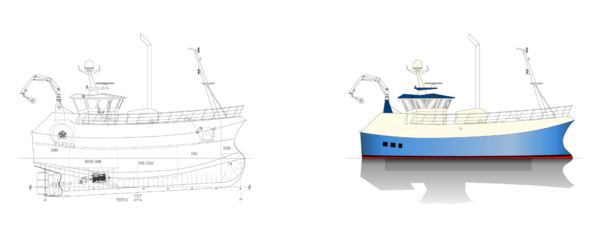A report produced by Macduff Ship Design and Fisheries Innovation Scotland (FIS) have released a report taking a practical look at decarbonising the UK fishing fleet, this time comparing hydrogen fuel as an option to deliver net-zero fishing vessels.
With support from Marine Fund Scotland, the report titled “Net Zero Vessels Concept Design Project, Stage 3” provides detailed vessel specifications, and – by drawing comparisons with previous research into the opportunities offered by battery-electric power, methanol, and liquified natural gas options – calls for crucial information to help fishing businesses stay safe and competitive as net zero deadlines approach.
Net Zero commitments
With the net zero commitments of 2045 for Scotland and 2050 for England on the horizon, the hydrogen-focused report identifies critical barriers to achieving net zero emissions and outlines the way for the development of six unique, alternatively-powered vessel designs.
Stage 1 was of the ‘CONCEPT DESIGN PROJECT’, completed in January 2023. The report analysed three different vessel types and highlighted a range of technical, financial, and regulatory barriers associated with a just transition to net zero vessels for the fishing sector. Stage 2 was of the ‘CONCEPT DESIGN PROJECT’, completed in August 2023, supported by Marine Fund Scotland. This report produced six concept designs for fishing vessels capable of net zero operation.
The new ‘Stage 3 Concept Design Project’ sees the introduction of three more innovative vessel designs, powered by hydrogen. By comparing the new specifications with a diesel ‘parent vessel’, and with previous ‘Stage 2’ designs under the same project, the research offers insights into the financial and operational implications of hydrogen as a fuel source for different vessel types, and different fishing patterns.
Executive Director of FIS, Kara Brydson, underscored the importance of addressing such barriers, stating, “This programme of work is right at the core of FIS’ mission, helping UK fishing stay safe and competitive as it adopts alternative fuels to catch low carbon, nutritious seafood. The detail can seem overwhelming when there are so many variations in vessel type and fishing activity around our coast – that’s why we chose to dive in with direct comparisons to active vessels, and explore all possible impacts of business viability, safety, and feasibility from a regulatory and infrastructure perspective. Fishing vessel owners are forward looking, but they’re also practical people who want answers on future fuel costs, availability, and access.”
Roadmap to transition
Key findings from the report suggest that hydrogen is unlikely to be a suitable option for smaller creel vessels, due to its increased complexity, safety concerns, and additional costs compared to battery electric alternatives. Similarly, for the majority of Nephrops and whitefish trawlers, hydrogen poses challenges due to range and hold space limitations, making methanol a more competitive option for longer-duration operations, unless hydrogen vessel size is significantly larger.
To support UK fishing vessel owners in transitioning away from fossil fuel diesel, the report introduces a roadmap, identifying essential short, medium, and long-term actions. These recommendations range from studies on future fuel infrastructure to collaborative projects building vital demonstrator vessels.
“We’ve outlined steps to help fishing vessel owners make informed choices on this transition, in a relevant timeframe”. Brydson comments, “There’s an urgency to this – vessels being built right now will still be fishing as we hit decarbonisation deadlines, so we need practical details of what must happen, and in what order, to help the UK seafood industry plan from here to net zero.”
